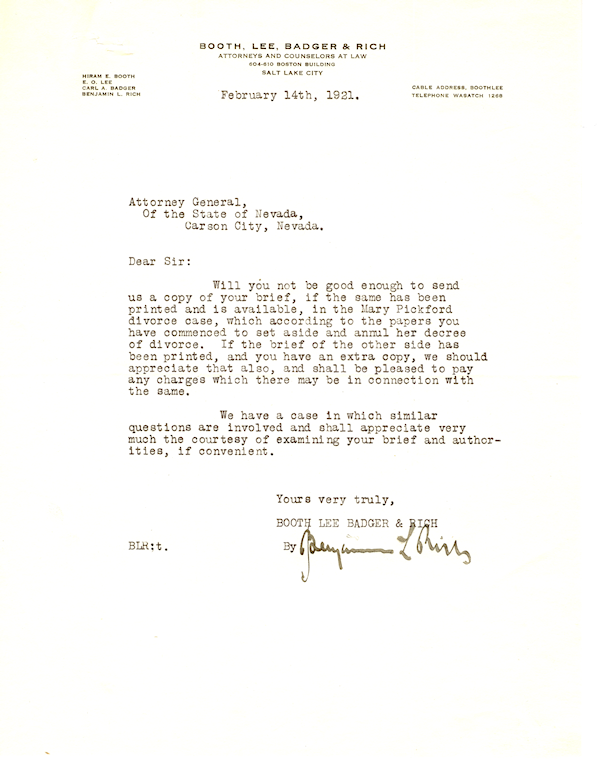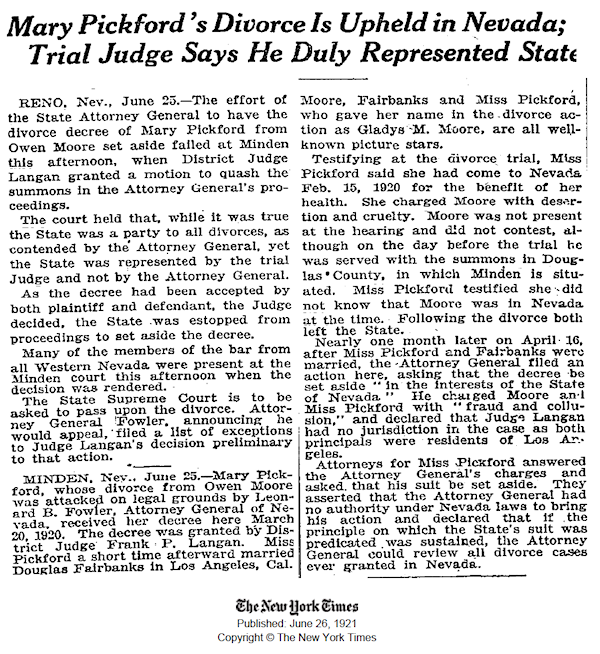Term: January 6, 1919–January 1, 1923
Biography
Leonard Burke Fowler, born October 20, 1877, in Visalia, California, was the son of Thomas and Mary E. (Farley) Fowler. Educated in the public schools in California from 1894-1897, Fowler graduated from St. Joseph's College, San Jose, California.
Fowler, admitted to the California State Bar on August 31, 1899, practiced law in California until 1908 when he moved to Carson City, Nevada. In 1914, Fowler ran against incumbent E.E. Roberts (Republican) for Nevada’s only congressional representative seat but was defeated.
After leaving the Nevada Attorney General’s Office, Fowler practiced law in Fresno and Madera, California.
Shockingly, Fowler died destitute and alone in San Francisco, California, as reported in the Reno Evening News, Saturday, June 13, 1942, p. 14:
Sister Identifies L. B. Fowler’s Body
Once Legal Head of this State
A man found dead in a small hotel room in San Francisco with thirty-one cents in his pockets and a half-eaten loaf of bread beside him, today was identified by a sister as Leonard B. Fowler, one-time attorney general of Nevada.
It was Fowler who disputed the legality of Mary Pickford’s Nevada divorce in 1920 from Owen Moore. The Nevada Supreme Court subsequently overruled Fowler.
Police at San Francisco said that a nun, Sister M. Gabriel of St. Helen’s hospital, Chealls, Wash., a sister of Fowler, telegraphed that from a description of the man found dead, she was convinced he was her brother.
An insurance policy and other papers into [sic] the man’s room constituted other evidence.
Fowler was attorney general of Nevada from 1918 to 1922. He left shortly thereafter and practiced law in Fresno and more recently in Madera. He was born in Visalia in 1877, and was graduated from St. Joseph’s College, San Jose. Two years ago his wife died.
Election of 1918
Elected as Nevada’s 17th Attorney General on November 5, 1918, Fowler (Democrat) received 12,711 (53.1%) of the 23,245 votes cast; and George S. Green (Republican) received 11,247 (46.9%) of the votes.[1]
Unlike his immediate predecessor, Attorney General Thatcher, Fowler often challenged Nevada’s liberal divorce laws. Fowler made national headlines when, on April 14, 1920, he accused then-famous silent movie star Mary Pickford of perjury and collusion in obtaining a divorce from husband, Hollywood actor Owen Moore. Pickford married Douglas Fairbanks three weeks after her divorce from Moore, and Fowler alleged that her illegal divorce was an action that could destabilize the state’s divorce industry and make her a bigamist.
On June 25, 1920, Douglas County, Nevada, District Judge Frank Langan granted a motion to quash Thatcher’s summons in this matter and ruled that since the state of Nevada was represented at Pickford’s divorce trial by him, the state of Nevada was estopped from proceedings to set aside Pickford’s divorce
Interest in the Pickford case continued, as shown by this letter to Fowler:

Source: Nevada State Library and Archives, Carson City, Nevada
On June 25, 1921, The New York Times published the following article:

Source: The New York Times, June 26, 1921
Fowler appealed Judge Langan’s decision to the Nevada Supreme Court, but on May 31, 1922, the Nevada Supreme Court ruled against Fowler:
The Attorney General has no power to intervene in a divorce suit or to bring an independent action to set aside a decree of divorce for fraud or collusion, either under the common law, or under the state statutes, including Rev. Laws, § 4133, giving the Attorney General the right to commence suit or make a defense where he deems it in the “interest of the state”; for the word “interest” must be taken in its common acceptation as relating to the interest of a party in the ordinary sense of the word. 46 Nev. 64 (Nev. 1922)
Office Administration & Duties
Fowler’s staff consisted of Deputy Attorney General Robert Richards and stenographer Margaret Curban according to the Nevada Attorney General’s budgets for the 1919–1921and 1921–1923 state biennial fiscal periods:
1919 – 1921
|
$7,200
|
|
$2,800
|
Attorney General’s Salary
|
|
$3,000
|
For salary of the Attorney General as ex officio Mineral Land Commissioner
|
|
$6,000
|
Deputy Attorney General’s Salary
|
|
$3,000
|
Deputy Attorney General’s Salary
|
|
$1,500
|
Stenographer Salary
|
|
$4,500
|
Typist Salary
|
1921 – 1923
|
$7,200
|
|
$2,800
|
Attorney General’s Salary[2]
|
|
$6,000
|
For salary of the Attorney General as ex officio Mineral Land Commissioner
|
|
$3,000
|
Deputy Attorney General’s Salary
|
|
$3,000
|
Stenographer Salary
|
The 1919 Nevada State Legislature did add the following duties to the Nevada Attorney General’s Office:
-
The Attorney General “. . . shall be informed, or shall have reason to believe that any real or personal estate has become escheatable to this state . . . it shall be his duty to file an information on behalf of the state . . .” (Statutes of Nevada 1919, Chapter 23, Section 274, p. 34).
- The Nevada State Board of Finance is created with the Attorney General to be its legal advisor. (Statutes of Nevada 1919, Chapter 93, Section 4, p. 164).
-
The Nevada Public Utilities Commission with three members—with a Public Service Board created within the Public Service Commission—was created. The Attorney General is to be a member of the Public Service Board. The Public Service Board is to appoint two of the three members of the Nevada Public Utilities Commission (the one remaining member appointed by the Governor). (Statutes of Nevada 1919, Chapter 109, Section 2, pp. 198 -199).
-
The Office of State Engineer is created. The Nevada Attorney General is to be the legal advisor to this State Engineer and “. . . shall prosecute in the name of the State of Nevada all actions for enforcement of this act . . .” (Statutes of Nevada 1919, Chapter 214, Section 40, p. 214).
-
The Industrial Insurance Commission is created. The Attorney General is to “. . . give his opinion in writing as to the validity of any act or acts of any state or county or city or school district under which said bonds are issued . . . ” (Statutes of Nevada 1919, Chapter 176, p. 311).
- The Reclamation and Settlement Board is created with the Attorney General, and “. . . shall be its legal advisor and represent the board in any suits or action which may arise out of the discharge of its duties . . .” (Statutes of Nevada 1919, Chapter 191, Section 2, p. 343).
[1]Political History of Nevada, 2006, p. 373.
[2] There is a statutory conflict concerning the Attorney General’s salary. Statutes of Nevada 1921, Chapter 117, p. 192 (approved March 21, 1921) set the salary of the Attorney General at $5,000. However, Statutes of Nevada 1921, Chapter 162, p. 43 (approved March 22, 1921) set the Attorney General’s salary at $7,200.
[3] The right of citizens of the United States to vote shall not be denied or abridged by the United States or by any state on account of sex. Congress shall have power to enforce this article by appropriate legislation. (United States Constitution, Article XIX).